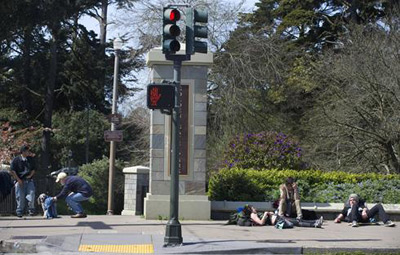Since the "Summer of Love" more than 40 years ago, this liberal city and its legendary Haight-Ashbury neighborhood have been magnets for the young, the alienated, the down-and-out and the stoned - and for tourists eager to watch them.

San Francisco wants to prohibit people from sitting or lying down on sidewalks to cut down on "street thugs" and panhandlers. It would also make lounging near the entrance to Golden Gate Park, seen here, illegal. (Jessica Brandi Lifland, for USA TODAY)
But residents, merchants, police and Mayor Gavin Newsom say what was once a flower-power scene on bohemian streets now displays an ugly, even violent side. They are calling for an ordinance to make it easier for police to clear sidewalks of what they say are aggressive panhandlers and the open use of drugs.
"The community is just fed up with the lack of civility and how it had changed in the last 10 years," says police Capt. Teri Barrett, who heads the district that includes Haight Street and nearby Golden Gate Park. "They are very compassionate people, and they have had enough."
The ordinance, proposed by Newsom and Police Chief George Gascon, would prohibit sitting or lying on public sidewalks between 7 a.m. and 11 p.m. Benches and parks would be excluded.
First-time violators would face a fine of up to $100 and community service, and repeat violators could face a fine of up to $500 and 30 days in jail.
The law would apply throughout the city. But it is aimed at the neighborhood defined by the intersection of Haight and Ashbury streets, ground zero for 1967's Summer of Love, as well as downtown areas where tourists attract panhandlers.
Newsom's proposal was triggered in part by his own shock at the street scenes since moving his family to the neighborhood. He said while strolling his young daughter down Haight Street, he saw and spoke with a man smoking crack. "This is a behavior issue," Newsom says.
The proposal has drawn condemnation from some advocates for the homeless, who call it an attempt to push the poor out of sight.
"If they enforce the law the way it's written, people will think they live in a police state," says Alan Schlosser, legal director of the American Civil Liberties Union of Northern California.
Yet San Francisco is following a path of several other West Coast cities. Berkeley, Santa Cruz and Palo Alto - all university cities in the San Francisco Bay Area - have enacted similar ordinances, as have Portland and Seattle.
Santa Cruz Mayor Mike Rotkin supports the ordinance. He says Santa Cruz has used a more limited law to clear certain blocks. "We haven't solved our problem with people blocking the sidewalk and creating unfriendly space," Rotkin said. "On the other hand, it's been a huge improvement."
Police say they want the ordinance because existing laws aren't enough.
Barrett said laws against aggressive panhandling and blocking the sidewalks require a citizen or merchant to sign a complaint and agree to appear in court before police can act, unless an officer sees the infraction take place.
San Francisco's elected public defender, Jeff Adachi, has urged the Board of Supervisors to reject the ordinance and said he expects to challenge its constitutionality if a person is charged under it. He argues that innocent tourists waiting for a taxi could find themselves in trouble.
"The problem with the proposed law is it gives the police too much discretion to decide who should and shouldn't be prosecuted," Adachi said.
Maria Foscarinis, executive director of the National Law Center on Homelessness and Poverty in Washington, D.C., says such ordinances are part of a trend toward criminalizing poverty. In a report last year, her group said 30% of 235 cities it surveyed had enacted ordinances restricting sitting or lying down in public places. "They seem to be on the upswing now as homelessness rises dramatically due to the foreclosure crisis," she said.
But the issue isn't homelessness and he isn't criminalizing poverty, Newsom insists.
On any given night, San Francisco's homeless shelters have more than 100 empty beds, he says. The city has kept its shelters open 24 hours and even accommodates dogs. He says one study has found 44% of people living on the streets of San Francisco have been in the city less than 90 days.
Kent Uyehara, who runs skateboard and snowboard shops on Haight Street, says he and other merchants proposed the idea to police last fall. He says merchants are fearful of calling police because they may face broken windows, graffiti or other vandalism in retribution. "Last summer it kind of reached a boiling point," Uyehara said.
Rob McConihe, who manages rental apartments and stores along Haight Street, said he had seen panhandlers intimidate and shake down passersby. "It's horrible for business," he said. "The city has become more violent."
Interviews with street people on Haight recently revealed that panhandlers can make $100 a day.
The proposed law could affect Lynn Gentry, 23, who has found artistic work in the neighborhood since 2007. Gentry sits on a chair on the sidewalk with a typewriter, offering poetry for a donation. He worries the law could put him out of business. "It depends on how they enforce it," he says. "Sitting down - I mean, that's a non-violent act."
Newsom says he expects the Board of Supervisors will reject his ordinance. If so, he says he will use his power as mayor to put the issue on the November ballot for voters to decide.
"I think if you live and work on Haight Street, it makes a lot of sense," said January Pongtratic, who manages a store on Haight. "They're pretty relentless, the loiterers."











